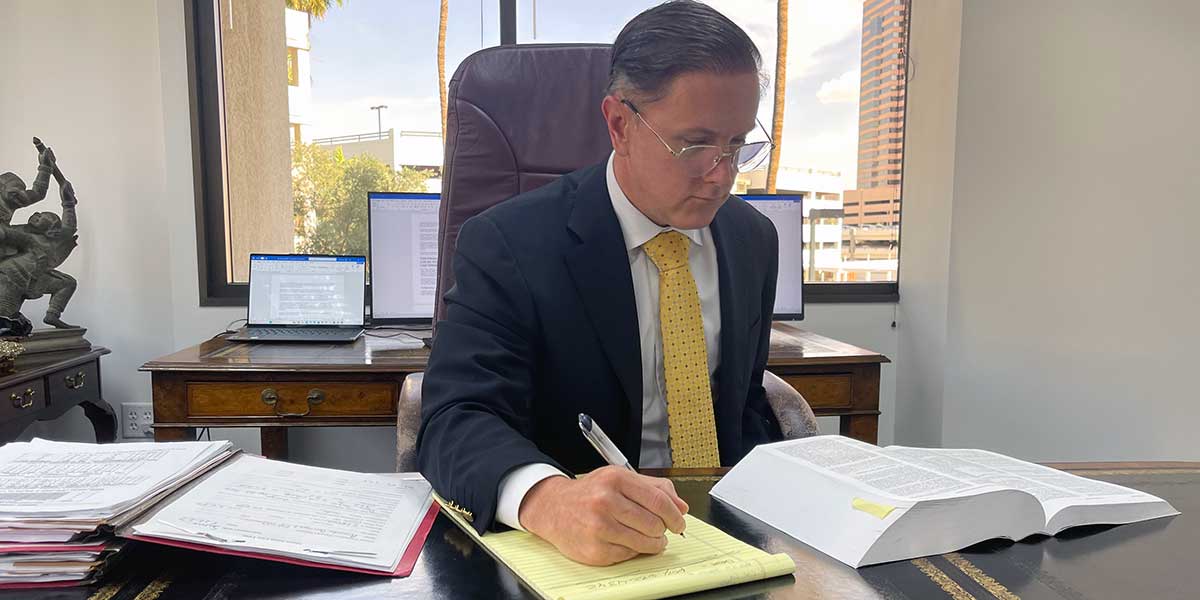Understanding the laws and penalties related to prostitution in Arizona is essential, particularly for those charged under Arizona Revised Statute 13-3214.
Per ARS 13-3214, prostitution is a Class 1 misdemeanor for first-time offenders, but the consequences become more severe with prior convictions of prostitution, potentially leading to felony charges and mandatory jail time.
ⓘ This article will cover the following topics:
- How is Prostitution in Arizona Defined Under ARS 13-3214
- Sentencing and Potential Penalties
- What is Manifesting Intent to Commit Prostitution?
- What Behaviors are Considered Prostitution Under Arizona Revised Statutes 13-3214
- Can Escorting Lead to a Prostitution Conviction?
- Is Solicitation of Prostitution a Felony in Arizona?
- What Potential Legal Defenses Can Be Used Against Prostitution Charges
- 10 Frequently Asked Questions: Arizona Prostitution Laws
- Contact a Sex Crime Defense Attorney From Kolsrud Law
Having an experienced criminal defense representation is key in these situations, and Kolsrud Law Offices offers the expertise needed to protect your rights. With a thorough understanding of Arizona’s legal system and extensive legal knowledge, the attorneys at Kolsrud Law Offices are dedicated to providing a strong defense, whether you’re facing your first offense or dealing with the impact of prior convictions.
Contact us today to schedule a free consultation and learn more about how we can help you.

How is Prostitution in Arizona Defined Under ARS 13-3214
Prostitution, under Arizona Revised Statutes (ARS) 13-3214, is defined as the
act of knowingly engaging in sexual conduct with another person for a fee or other compensation.
- Unlawful Engagement: It is illegal for any person to knowingly engage in prostitution. This encompasses both offering and agreeing to exchange sexual acts for money or other forms of compensation.
- Local Ordinances: Cities and towns in Arizona have the authority to enact and enforce their own ordinances aimed at suppressing and prohibiting prostitution. These local laws must provide penalties that are at least as stringent as those outlined in ARS 13-3214.
- Prior Violations: For sentencing purposes, a previous violation of a city or town ordinance related to prostitution, if it has similar elements to ARS 13-3214, is considered a previous violation of the state statute. This means that repeated offenses can lead to harsher penalties, regardless of whether they were prosecuted under local or state laws.
- Affirmative Defense: A defendant can use the affirmative defense that their acts of prostitution were a direct result of being a victim of sex trafficking. This acknowledges the complexities and victimization that can be involved in prostitution cases.
Sentencing and Potential Penalties
The penalties for violating ARS 13-3214 are tiered based on the number of offenses:
- First Violation: Classified as a Class 1 misdemeanor, with a mandatory minimum sentence of fifteen consecutive days in jail. Probation or suspension of the sentence is not allowed until the entire sentence is served.
- Second Violation: Also a Class 1 misdemeanor, but with a mandatory minimum sentence of thirty consecutive days in jail. Again, no probation or suspension of the sentence is allowed until it is fully served.
- Third Violation: Still a Class 1 misdemeanor, requiring a minimum of sixty consecutive days in jail. Additionally, the individual must complete a court-ordered education or treatment program.
- Subsequent Violations: For individuals with three or more prior convictions, a subsequent violation is classified as a Class 5 felony. This results in a minimum of one hundred eighty consecutive days in jail, with no eligibility for probation or suspension of the sentence until the entire sentence is served. Further incarceration in the state department of corrections may also be imposed.
| Violation | Classification | Penalties |
|---|---|---|
| First Violation | Class 1 Misdemeanor | Mandatory minimum of fifteen consecutive days in jail. No probation or sentence suspension until full sentence is served. |
| Second Violation | Class 1 Misdemeanor | Mandatory minimum of thirty consecutive days in jail. No probation or sentence suspension until full sentence is served. |
| Third Violation | Class 1 Misdemeanor | Minimum of sixty consecutive days in jail, plus completion of a court-ordered education or treatment program. No probation until full sentence is served. |
| Subsequent Violations | Class 5 Felony | Minimum of one hundred eighty consecutive days in jail, with no eligibility for probation or sentence suspension until full sentence is served. Possible further incarceration in state corrections. |

What is Manifesting Intent to Commit Prostitution?
Manifesting intent to commit prostitution under ARS 13-3214 involves behaviors that suggest an individual's intention to engage in prostitution, even if no explicit agreement or sexual act has occurred.
These behaviors include repeatedly stopping or attempting to stop pedestrians or vehicles, beckoning to passersby, circling an area in a vehicle, or engaging in conversations that imply solicitation of prostitution.
Law enforcement uses these indicators to preemptively address potential prostitution activities. Defending against such charges requires demonstrating a lack of intent, entrapment, or insufficient evidence to substantiate the claim.
What Behaviors are Considered Prostitution Under Arizona Revised Statutes 13-3214
Under Arizona Revised Statutes 13-3214, several behaviors can be considered prostitution, leading to criminal charges.
The statute defines prostitution as knowingly engaging in or offering to engage in sexual conduct with another person for a fee or other consideration. Here are some examples of behaviors that fall under this definition:
- Offering Sexual Services for Money: Directly offering or agreeing to perform sexual acts in exchange for money or goods is considered prostitution under Arizona law.
- Soliciting Sexual Acts: Approaching or communicating with someone to solicit sexual favors for compensation, whether through verbal offers or gestures, is also prohibited.
- Engaging in Sexual Conduct for a Fee: Any act of performing sexual activities after an agreement involving payment is a clear violation of ARS 13-3214.
- Arranging or Facilitating Prostitution: Even if an individual does not directly engage in sexual conduct, arranging or facilitating the transaction of sexual services for payment can also lead to prostitution charges.
These behaviors, whether performed directly or indirectly, are all considered prostitution under Arizona state law and can lead to severe legal consequences, including arrest, prosecution, and penalties outlined in ARS 13-3214.

Can Escorting Lead to a Prostitution Conviction?
Escorting itself is not illegal in Arizona, but the line between legal escort services and illegal prostitution can be thin.
While providing companionship for a fee is permissible, any exchange of sexual favors for money is strictly prohibited under ARS 13-3214.
Escort services must operate without engaging in or promoting sexual activities to stay within legal boundaries.
Is Solicitation of Prostitution a Felony in Arizona?
In Arizona, solicitation of prostitution can be either a misdemeanor or a felony, depending on the circumstances and the individual's prior offenses.
For a first-time offender, solicitation is typically classified as a Class 1 misdemeanor.
However, if an individual has multiple prior convictions for similar offenses, subsequent charges can escalate to a Class 5 felony under ARS 13-3214.

What Potential Legal Defenses Can Be Used Against Prostitution Charges
Defending against prostitution charges in Arizona requires a comprehensive understanding of the law and strategic planning.
Below are some common defenses that can be used and examples:
Lack of Intent
A key defense is demonstrating that the defendant did not have the intent to engage in prostitution. This can be crucial in cases where the evidence is circumstantial or based on behaviors that might suggest intent but do not conclusively prove it.
Entrapment
- Entrapment occurs when law enforcement officers induce a person to commit a crime they otherwise would not have committed. This defense involves showing that the defendant was coerced or persuaded by the police to engage in prostitution, which they had no predisposition to do.
Insufficient Evidence
- Challenging the sufficiency of the evidence is another potential defense. This might involve questioning the credibility of witnesses, the accuracy of police reports, or the legality of the arrest procedures. If the prosecution cannot provide adequate evidence to prove beyond a reasonable doubt that the defendant engaged in or intended to engage in prostitution, the charges may be dismissed.
Affirmative Defense
- Arizona law provides an affirmative defense for individuals who committed acts of prostitution as a direct result of being victims of sex trafficking. This defense requires presenting evidence that the defendant's actions were coerced and that they were under the control of a trafficker at the time of the offense.
Public Breastfeeding Exception
For women charged with indecent exposure related to breastfeeding, Arizona law specifically exempts breastfeeding from being considered indecent exposure. This defense can quickly resolve cases involving breastfeeding in public.
10 Frequently Asked Questions: Arizona Prostitution Laws
- What constitutes a prostitution offense under Arizona Revised Statute 13-3214?
Prostitution is defined as offering to engage in sexual conduct with another person in exchange for a fee. This is considered a Class 1 misdemeanor under ARS § 13-3214, with increasing penalties for repeat offenses. - How is prostitution defined within Phoenix city limits under the Phoenix Municipal Code § 23-52?
The Phoenix Municipal Code § 23-52 outlines specific behaviors that are considered prostitution, aligning closely with ARS § 13-3214, but also includes additional provisions unique to the city. - What are the potential penalties for a person convicted of prostitution under ARS § 13-3214?
A first offense is a Class 1 misdemeanor, but penalties increase significantly for subsequent offenses, including mandatory jail time and, for a fourth offense, the possibility of being sentenced to years in prison. - Is soliciting prostitution also illegal under Arizona state law?
Yes, soliciting prostitution is illegal under Arizona Revised Statute § 13-3211, and it carries similar penalties to those outlined in ARS § 13-3214. - Can prior felony convictions affect sentencing for a prostitution offense in Arizona?
Yes, prior felony convictions can lead to more severe penalties, including longer jail sentences and extended probation periods for anyone convicted of prostitution. - What legal challenges can arise from being charged with prostitution in Arizona?
Legal challenges include navigating the complexities of state laws, such as ARS § 13-3214, understanding the implications of the Phoenix Municipal Code § 23-52, and addressing potential requirements to register as a sex offender. - What are the penalties for a fourth offense of prostitution in the state of Arizona?
A fourth offense of prostitution under ARS § 13-3214 is classified as a Class 5 felony, which may result in a mandatory minimum sentence of 180 days in jail, years of probation, and other severe consequences. - What are the legal consequences if convicted of soliciting prostitution in Arizona?
Conviction for soliciting prostitution under ARS § 13-3211 can result in similar penalties to a prostitution conviction, including jail time, probation, and fines, depending on the specifics of the case and prior offenses. - Does Arizona law require individuals convicted of prostitution to register as sex offenders?
While not always required, certain aggravated circumstances or repeat offenses under ARS § 13-3214 may lead to a requirement to register as a sex offender, which carries long-term social and legal consequences. - How long can someone be sentenced to jail for a prostitution conviction in Arizona?
For a first conviction, the sentence may be as short as 15 days, but it can extend to years in prison for repeat offenders, particularly on a fourth offense, under ARS § 13-3214.

Contact a Sex Crime Defense Attorney From Kolsrud Law
If you’re facing prostitution or related sex crime charges in Arizona, having a skilled defense attorney is crucial.
Josh Kolsrud, founder of Kolsrud Law, brings a wealth of experience to your defense. A native Phoenician, Josh graduated summa cum laude from Arizona State University’s Barrett Honors College before earning his Juris Doctor from the University of Miami School of Law.
With a career that began at the Maricopa County Attorney’s Office, Josh has handled over 3,500 cases and more than 100 jury trials, earning multiple “Attorney of the Month” awards for his exceptional trial work.
At Kolsrud Law, we understand the severe implications of a conviction under ARS § 13-3214 and work tirelessly to protect your rights and future. If you’ve been charged with a sex crime, give us a call to discuss your case with a seasoned criminal defense lawyer who can provide the expert legal counsel you need.
Contact us a call immediately at (480) 680-9769 so we can get started right away at building a solid defense strategy.
Contact us today to schedule
A FREE CONSULTANT and learn more
about how we can help you.
An award-winning criminal defense attorney Since 2006
Why Choose Josh Kolsrud
With over 100 jury trials to his name, and years of experience as a state and federal prosecutor, Josh understands the law, the legal process, and your rights. Josh is also committed to representing every client with utmost integrity and dedication
Experience
Josh has prosecuted major crimes on the state and federal level, led a successful anti-human sex trafficking operation that saved lives, and argued before countless juries and justices for his clients
Expertise
Josh is an expert in both Arizona and federal criminal law, and is ready to put that expertise to work for you.
Dedication
As a prosecutor, Josh saw far too many defendants lose their livelihood due to poor representation. Josh will always give every client his complete attention and effort
Get a Free Initial Consultation:
Please complete our form below to get a free initial consultation
or call us at (480) 999-9444.
